Sep 2020 2nd edition
Sep 2020 2nd edition vuyelwan
Translations
A champion for children
A champion for children UrsulaParents who are quarrelling and cannot agree on the best method of raising children can now find help at the Office of the Family Advocate. 
“In Section 28, the Constitution says the rights of the child are paramount to any other rights, so the Office of the Family Advocate is there for the best interests of the child. Whenever there is a parental dispute over responsibilities and rights, the Family Advocate can step in in several ways,” says Chief Family Advocate Petunia Seabi-Mathope.
As a first means of intervening, the Office of the Family Advocate tries to avoid court action and opts to mediate between the two warring parents. Seabi-Mathope says this is because parents must spend a lifetime working together in the interests of the child. If they cannot settle their differences through the mediation process, then the Family Advocate will investigate the circumstances surrounding the child’s welfare.
“When the parents cannot agree out of court, we will start an investigation in partnership with a family counsellor,” she says.
The investigation produces a report that is presented in court in order to assist the court in deciding what is in the best interest of the child.
The Office of the Family Advocate assists all parents, whether they are married or not.
Seabi-Mathope says they also assist parents who have broken up with their partners to get full parental rights, if that is what is best for the child. The Office of the Family Advocate does this by looking at whether a parent has played a role in the life of the child, through child maintenance or the traditional ceremony of paying damages.
When the parents do not live in the same home, the Family Advocate can draft a parenting plan that states the responsibilities of each parent.
If one of the parents does not stick to the parenting plan and the Office of the Family Advocate is unable to find a solution, then one can approach the Children’s Court to have the court enforce the agreement.
For more information about the Office of the Family Advocate, call 012 357 8022 or email NationalOffice-FA@justice.gov.za
Artisan’s business grows despite lockdown
Artisan’s business grows despite lockdown SiboneloAn aluminium frame constructing business, owned by a young woman, is growing in leaps and bounds. 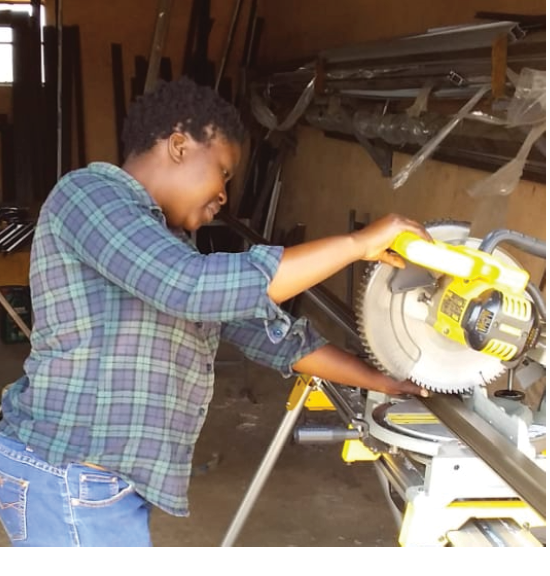
Bahwithi Construction and Aluminium Framing, started in 2015, no longer operates from the home of its owner, Sarah Mogashoa (32). Instead, thanks to R50 000 National Youth Development Agency (NYDA) funding – through its 1 000 Youth-Owned Enterprises in 100 Days initiative – Bahwithi proudly occupies its own business premises.
She bought new machinery and relocated her business to an area that will enable her to find new clients for the aluminium doors, windows and gates that Bahwithi produces.
“Currently, we mainly service businesses around Polokwane and I want to grow beyond that,” she says.
During the early days of the lockdown, with only essential services and industries allowed to operate, Mogashoa says her business ground to a halt.
She had to find new ways of keeping the business afloat and she resorted to doing repair work. This was also to ensure that she can continue to pay the salaries of her five employees.
Furthermore, she had an idea to design, manufacture and fit aluminium frames for both homes and business premises. This helped sustain her business during the different stages of the lockdown.
Operating in a male-dominated industry has had its challenges. Despite being a skilled artisan, Mogashoa lost clients because of her gender. “There are people who come to my business but when they learn that a woman is in charge, they don’t want to use our services.
“As a woman in this field, I am frequently discriminated against. I want people to give me a chance and judge me on my work rather than my gender,” says Mogashoa.
In order to end the discrimination that she has experienced, Mogashoa urges more women to train as artisans.
The 1 000 Youth-Owned Enterprises in 100 Days initiative funded 1 000 youth-owned businesses. Funding was given to businesses that showed the capacity to grow and innovate.
Mogashoa says funding initiatives like these help create more youth entrepreneurs who can create job opportunities. Given how hard it is to find a job, it is important to enable more people to earn a living.
Calling all women: Go Hustle!
Calling all women: Go Hustle! UrsulaThe Go Hustle website is providing focused career advice for women and sharing inspirational success stories. 
Successful magazine editor Danielle Weakley started Go Hustle to help South African women benefit from the growth of female-focused career platforms around the world, such as women-only conferences and networking events.
“I know how many young women are intimidated when applying for their first job, being interviewed or pitching their products and services. I wanted to develop an inspiring space for young women to access the tips and tricks they need to succeed,” says Weakley.
The website provides a wealth of advice on career development, health and wellness and money management. Users sign up for free and can access information about job opportunities, internships and networking events.
“The career space, from a content and networking point of view, has always been a male-dominated space. It never felt like an accessible space for a young girl starting out and seeking information and inspiration. We wanted our platform to be wholly feminine – inspiring young women by profiling women they see in themselves, but also giving them sound, workable advice and not talking down to them,” Weakley says.
Khanyisa Mabala, a quantity surveyor who has been profiled by Go Hustle, is passionate about the growth of young women, especially in the male-dominated construction industry.
“I am most passionate about seeing young women grow in my industry. It’s amazing to see the great strides and spaces women are taking up in the industry. It’s even more amazing when you’re afforded the opportunity to contribute towards that growth,” she says.
To young women hoping to become successful entrepreneurs, Mabala says:
- Find work that best suits your personality and matches your values.
- Study maths and science at school and pass both with at least 60 percent.
- Find someone in the industry to help you with the job-seeking process.
- Put yourself out there by attending networking events and engaging with industry insiders.
- Establish yourself on social media platforms.
For more information, visit Go Hustle at www.gohustle.co.za
Celebrate Heritage Month online
Celebrate Heritage Month online UrsulaAs the country continues to open up the economy and ease national lockdown regulations, the South African State Theatre keeps arts and music lovers entertained from the safety of their homes. 
This Heritage Month, the State Theatre offers entertainment through an online programme which will be headlined by award-winning jazz music sensation Zoë Modiga.
The virtual concert will premiere on 27 September at 3pm, on the theatre’s online platform. The State Theatre event will be Modiga’s first full-piece performance in 2020.
The State Theatre describes Modiga as an artist who represents the present and future of South African music, drawing on the roots of African storytelling, jazz composition and Motown soul, yet creating a sound entirely her own.
This month’s programme will also feature culture and heritage enthusiast and revered musician Mbuso Khoza, who will perform Amahubo in Concert on Heritage Day, 24 September. This premiere will also feature singer Zawadi Yamungu.
Khoza says the event seeks to encourage people to embrace and fall in love with their histories.
“The concert comes as a call for the preservation of our heritage, while encouraging Africans to stay in love with who they are and where they come from. Amahubo are the songs of the ancients,” says Khoza.
Also coming in September is the musical play Fela and the Kalakuta Queens, which was performed at the State Theatre in 2019 and tells the story of the late Fela Kuti. This is archival footage and not a live show. It can be enjoyed until 30 September.
Another musical extravaganza brought to theatre lovers is Sneeuwitjie, an Afrikaans version of the pantomime Snow White, which will run until 27 September.
On 25 September, the State Theatre will host a free webinar in association with the South African National Antarctic Programme. It will focus on the importance of indigenous languages in the professional space, under the topic: “Art in our Languages - Cultivating Stories, Preserving our Languages.”
Theatre lovers must subscribe to the State Theatre’s YouTube channel to watch the productions. Tickets can be purchased from Webtickets and cost between R70 and R100.
Court support for GBV victims
Court support for GBV victims Sibonelo If you have suffered gender-based violence (GBV) and are in need of support at court, the National Prosecuting Authority (NPA) has a specialised service to assist you.
If you have suffered gender-based violence (GBV) and are in need of support at court, the National Prosecuting Authority (NPA) has a specialised service to assist you.
The Ke Bona Lesedi Court Preparation Programme is available at most Sexual Offences Courts and other courts that deal with GBV. Ke Bona Lesedi means ‘I see the light’ when translated from Setswana.
A GBV victim can submit a request to the NPA for assistance. The senior public prosecutor or court preparation manager will then identify an appropriate court preparation officer to assist.
“The service does not promise a particular outcome in the case and each individual’s experience is unique. Nonetheless, it assists with empowerment and restoring the victim’s dignity,” says a statement from the NPA.
There are 161 court preparation officers at various courts across the country.
The service is one of various initiatives introduced by government to deal with the scourge of GBV.
According to the NPA, the complainant, victim, survivor or witness will be contacted by a court preparation officer from the court where she or he will testify.
The court preparation officer will be available to support the complainant at court and throughout the trial. Specialised tools and techniques are used to visually show the victim that she or he is heard, protected and respected.
Complainants can speak in their own language and the court preparation officer will ensure that the victim is referred for counselling or therapy, to complete their healing journey.
Many women and children who have suffered GBV, for example, rape, are anxious about going to court to testify and relate intimate details of events in front of strangers. This service will help them feel more at ease.
You can contact the court preparation manager/coordinator in your province by calling or emailing the contacts below:
- Eastern Cape (Grahamstown) – Pumla Nomfemele – 041 502 5443 – Pnomfemele@justice.gov.za
- Eastern Cape (Mthatha) – Sindisiwe Buthelezi – 047 501 2646 – Sbuthelezi@npa.gov.za
- Free State – Ena Liebenberg - 051 410 6029 – Eliebenberg@npa.gov.za
- Gauteng (Johannesburg) – Asewa Fundi – 011 220 4085 – Afundi@npa.gov.za
- Gauteng (Pretoria) – Esther Kabini – 012 351 6713 – Ekabini@npa.gov.za
- Kwa-Zulu Natal – Roelien Wiesner – 033 3928712 – Rwiesner@npa.gov.za
- Limpopo – Reneilwe Mashamaite – 015 483 0302 – Rmashamaite@justice.gov.za
- Northern Cape – Henley Nathan Sass – 054 337 5375 – HSass@justice.gov.za
- North West – Mmanotshe Seletisha – 012 700 9000 – Mseletisha@justice.gov.za
- Western Cape – Gary Titus – 021 487 7287/021 421 7287 - Gvtitus@npa.gov.za
- NSP - Head Office – Karen Tewson – 012 845 6399/012 812 6399 – Ktewson@npa.gov.za
Other important contact numbers to keep:
- SAPS Emergency Service: 10111
- GBV Command Centre: 0800 428 428 or dial *120*7867# from any cellphone.
- Persons with disabilities: SMS ‘help’ to 31531
- Women Abuse Helpline: 0800 150 150
- Childline South Africa: 0800 055 555
- SAPS Crime Stop: 0860 10111 or SMS 32211
- GBVF-related service complaints (SAPS): 0800 333 177/ complaintsnodalpoint@saps.gov.za
- Domestic Violence Helpline: 0800 150 150
- AIDS Helpline: 0800 012 322
Debt counselling: Keep your assets!
Debt counselling: Keep your assets! UrsulaWhile many South Africans are struggling financially, as a result of the economy and the effects of the coronavirus, debt counselling can help them to pay their debt and make sure that they do not lose their assets, such as their house, car or furniture. 
Debt counselling was introduced in the National Credit Act. It helps people who are struggling to pay their debts, by restructuring them to make repayments easier, says Advocate Kedilatile Legodi, the Acting Manager: Education and Communication at the National Credit Regulator (NCR).
“It also gives consumers an opportunity to start fresh and build a clean credit record,” she adds.
Debt counselling helps people to repay their debt, without borrowing money. And, if you apply before credit providers take legal action against you, your assets will not be taken away if you make repayments until your debt is paid.
Other benefits include:
- Living expenses such as groceries and school fees, are taken into account before you are told what to pay.
- A registered debt counsellor negotiates reduced repayments with creditors.
- Debt restructuring is approved by a magistrate court or the National Consumer Tribunal, so the repayment term is fixed.
- There is no limit to the amount of debt that can be placed under debt counselling.
- If your short-term debt is paid in full and your home loan payments are up to date, you will be issued with a clearance certificate. Your credit record will be cleared and you can start fresh.
What you need to know
To apply for debt counselling, a consumer must have an income. You also cannot go under debt counselling if you are still under debt administration.
“Once you apply for debt counselling, you will not get any further credit and your name will be flagged at the credit bureaus. This is not a listing, but an indicator that you have applied for debt counselling,” says Legodi.
She adds that people must ensure they receive a comprehensive explanation from the debt counsellor and understand the process, before they sign and accept the application. You must also know who your debt counsellor is (name and NCR registration number); what the consequences are; how your debt is going to be restructured; the cost involved; and what your rights and obligations are.
Debt counselling is offered by NCR-registered debt counsellors, but the service is not free. For more information and to get assistance from the NCR, visit www.ncr.org.za or call 0860 627 627.
Entrepreneur welcomes back guests
Entrepreneur welcomes back guests SiboneloAs the South African tourism sector recovers from months of difficulty, Nokuthula Hazel Bond (41) is grateful that her business survived, thanks to the R50 000 she received from the Department of Tourism’s Relief Fund.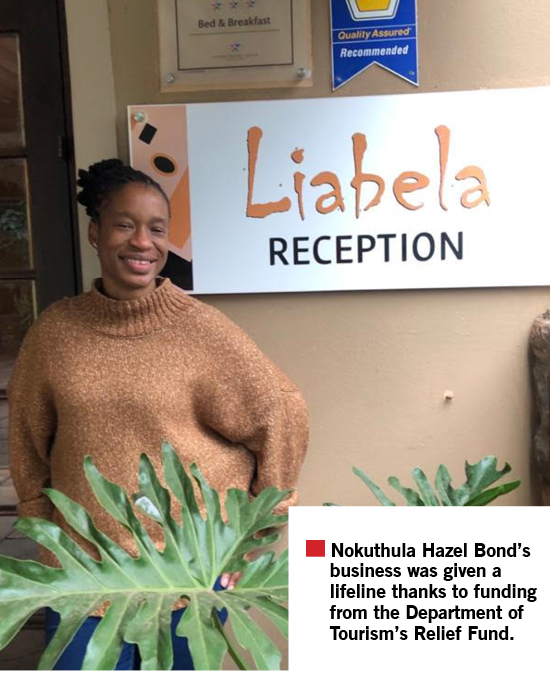
Bond is the owner of Liapolis Accommodation and Leisure, which owns Liabela Bed and Breakfast in Pinetown. The money was put towards operational costs, including the salaries of her four permanent employees. She also provides part-time jobs to two locals.
Now that the country is reopening for business, Bond has been doing aggressive marketing to reach business travellers, which is her target audience.
“We are slowly starting to see the market returning. During Tourism Month, we are promoting the province as a destination of choice,” she says.
She says the safety of her guests and staff members remain a priority and she has implemented a number of coronavirus health and safety measures, including deep cleaning the establishment before guests arrive and when they leave and disinfecting areas that are often touched. On arrival, guests and staff members’ hands are sanitised and their temperatures are taken. The wearing of masks is also mandatory.
The business was founded in her family home in 2006, but officially opened its doors in February 2007. Bond says her main motivation was to build a legacy for her children and to gain financial freedom.
“Part of our home was extended to add four guestrooms. We had to extend our bond for start-up capital. Even though my skills and knowledge of the industry were limited, I was prepared to learn. I was also motivated to build something from scratch with limited resources,” she explains.
Bond received non-financial assistance from the Small Enterprise Development Agency in eThekwini, Tourism KwaZulu-Natal and the Department of Economic Development and Tourism.
The mother of three says her childhood, in KwaMashu in the north of Durban, shaped the woman she is today.
“I became responsible from a young age as both my parents worked hard to make ends meet. My upbringing instilled in me the value of hard work and resilience. I have a Bachelor of Social Science degree from the University of KwaZulu-Natal, which took me longer to complete as I ran out of funds and had to work to finance the rest of my studies,” she says.
She has learned over the years that there will always be challenges in the business environment, as there are in life, and says if you want to succeed, you have to be able to adapt.
Government moves against corruption
Government moves against corruption vuyelwanPresident Cyril Ramaphosa’s promise to the nation to root out corruption relating to Coronavirus Disease (COVID-19) relief fund spending is being put solidly into action, with various investigations underway and the suspension of numerous government officials.
The President established an anti-corruption centre, bringing together nine state law enforcement institutions, including the Special Investigating Unit (SIU), to investigate allegations of corruption in areas such as the distribution of food parcels, Unemployment Insurance Fund (UIF), social relief grants and the buying of medical supplies and personal protective equipment (PPE).
The President is determined that every instance of corruption will be thoroughly investigated, that those responsible for wrongdoing will be prosecuted and that all money should be recovered. 
To ensure this, he signed a proclamation with the SIU to investigate any unlawful or improper conduct in the procurement of any goods, works and services during or related to the national state of disaster in any state institution.
The President also asked Auditor General (AG) Kimi Makwetu to audit the key COVID-19 initiatives introduced by government and the management of funds made available for them.
Makwetu recently released his first audit report into the findings, which focussed on R147.4 billion of the total R500 billion relief package, which was allocated through the June 2020 supplementary budget.
The AG’s report identified gaps, risks and inadequate controls and verification processes in the UIF Temporary Employee/Employer Relief Scheme (TERS), which was established to provide relief to employees who were retrenched or unable to work due to the lockdown.
These include illegal payments to people who were already receiving a government grant, students who were already receiving government funding, public servants, inmates, deceased people and children. The AG’s office is now investigating these payments.
Makwetu said that information was not captured correctly into the UIF system and manual claims increased the risk of invalid or manipulated claim information. This was also the case in the payment of the R350 relief funds which, said the AG, was paid to people it should not have been paid to.
There is also evidence of overpayments, underpayments and high claims. “I take these breaches very seriously,” said Minister of Employment and Labour Thulas Nxesi.
UIF officials suspended
Minister Nxesi said that the AG’s report indicated serious risks and violations. “In light of this, and because this occurred on his watch… I suspended the UIF Commissioner [Teboho Maruping].”
UIF senior management, including the chief financial officer, chief operating officer and head of supply chain have also been suspended.
“These moves allow for the SIU to conclude its forensic investigation. This is not the end of the matter,” says Nxesi.
A complete audit of all UIF TERS benefit payments will start in September.
“I assure you that I will not rest until every payment is accounted for and every wrong-doer made to account,” the Minister said.
He added that National Treasury will send resources to the UIF, to urgently implement the AG’s recommendations and solutions for the gaps and risks. National Treasury is also assisting to identify service providers to conduct a forensic investigation into the overall workings of the UIF.
“We will also be looking into the workings of the Compensation Fund,” Minister Nxesi confirmed.
He explained that 38 court cases have been opened and charges have been laid. Some of these cases are already in court and the perpetrators are in jail, the Minister said.
The AG will send a list of other possible fraud cases to the anti-corruption centre to be investigated.
PPE spending too high
Mkwetu said that audits into PPE spending are in different stages of completion, but show that orders placed by some health departments were for items priced more than double or even five times more.
“Similar instances were identified in the procurement of PPE in the education sector, where the national and provincial departments are not procuring PPE at market-related prices,” Makwetu said.
Although emergency procurement processes were allowed for buying PPE, not all supply chain management requirements were relaxed.
“Teams are still busy auditing the procurement processes, but are identifying matters such as suppliers not having valid tax clearance certificates, quotation and competitive bidding processes not being correctly applied, inadequate or inaccurate specifications and evaluation criteria and the incorrect application thereof, conflicts of interest, and the awarding of a contract in the health sector to a supplier with no previous history of supplying or delivering PPE,” Makwetu said.
How to deal with divorce
How to deal with divorce vuyelwanDivorce can be a painful separation of two people who were once married and loved each other at a certain point in their lives.
This is according to Ntwagae Shuping, a social worker supervisor at Bophelong Psychiatric Hospital in North West.
He further defines the concept of divorce as the death of marriage and says it impacts on the people who are close to the couple, especially if the two people were committed to each other.
Shuping says there are various challenges that married people face in their union and sometimes they choose to divorce instead of working things out.
He says the following issues could lead to divorce:
- Spouses having different belief systems, which results in conflict.
- Interfering or over-involved in-laws.
- The inability to conceive children.
- Different approaches or opinions to disciplining children.
- Infidelity or having children out of wedlock.
- Improper use of money.
- Unhealthy sexual relationship between the couple.
- Domestic violence.
“Divorce is not just the relational separation of the couple. It has emotional, mental, spiritual, financial and physical impacts on those involved. They also fear the unknown,” Shuping adds.
Sometimes, once a divorce has been finalised, the divorcees experience challenges that include fighting for custody of the children, depression and the loss of assets.
Advice for managing divorce
As a professional who sometimes provides counselling to people who have been affected by divorce, Shuping has a few tips for those who find it hard to accept the reality of being divorced.
- If you have done your best to salvage your marriage, honestly, let go.
- Speak to the people who you trust and who value you, such as your support system.
- Renew your strength and try to start a new life after divorce.
- If you think you are the cause of the divorce, ask for forgiveness and forgive yourself too.
- Allow yourself to go through all the stages of loss.
- Guard against harbouring a grudge against your ex-partner. This grudge will slow down your healing. Harbouring a grudge will destroy future relationships if you want to remarry.
- Leave the door open for reconciliation.
While getting a divorce ends a chapter in your life – and you will feel a range of emotions, from anger and loss to frustration and possibly relief – he says it is important to remember that it also signals a new beginning.
Inspirational guesthouse owner back in business
Inspirational guesthouse owner back in business SiboneloWith travel in South Africa allowed again, guesthouse owner Meisie Nkosi is ready to reach for the stars! 
Nkosi is an award-winning hospitality entrepreneur who has gone from selling eggs and sweets on the street, to running her own guesthouse and becoming a motivational speaker.
She is the owner of the luxury Bella Bonni Guest House in eMalahleni, Mpumalanga. She built her business from scratch and now employs six people.
“From childhood, I was always interested in selling things. I would use change to buy sweets and sell them at school or take boiled eggs my grandmother made and sell them. That was the start of my entrepreneurial journey.”
Nkosi studied education and worked as a teacher, but continued to nurture her talent for selling. After she met her husband, she stopped teaching and began to look at starting her own business.
“One of my friends showed me a house that was for sale and I thought I could turn it into a guesthouse. I approached the banks for funding, without really knowing how to go about it. I didn’t even know what a business plan was,” says Nkosi.
With help from the Small Enterprise Development Agency, Nkosi created a semi-completed business plan and eventually received funding in 2006.
Despite eMalahleni not being a tourist destination, Nkosi made a success of her business and became an inspiration to her community. Her efforts saw her being awarded the Small Business Entrepreneur of the Year Award in 2016, and she also became a motivational speaker.
Nkosi says that her success comes from hard work, determination and courage.
“One of the most important pieces of advice for young people is that you can start small. Just like I did. Find your passion and work hard to turn it into a living. Connect with people through networking and be respectful to everyone you meet – you never know what they might be able to offer you.”
Being in the hospitality industry has not been an easy journey, especially during the coronavirus. But, with domestic tourism now open, Nkosi is ready to continue her journey to the top.
“I have opened a small bed and breakfast in Pretoria and am also applying for a tender to open a hotel. My goal is to become the owner of a prestigious hotel,” says Nkosi.
Jobs: Department of Employment and Labour
Jobs: Department of Employment and Labour vuyelwanDirector: Risk Management
Centre: Directorate: Risk Management, Head Office
Reference No: HR 4/20/09/01HO
Salary: All inclusive: R 1 057 326 per annum
Enquiries: DDG: CS B Matebesi Tel: (012) 309 4865
Applications: Chief Director: Human Resources Management: Private Bag X 117, Pretoria, 0001
Email: Jobs-HQ@labour.gov.za
Principal Legal Administration Officer
Centre: Chief Directorate: Legal Services, Head Office
Reference No: HR 4/20/09/02HO
Salary: All inclusive: R 1 057 326 per annum
Enquiries: Ms V Singh
Tel: 012 309 4370
Applications: Chief Director: Human Resources Management: Private Bag X 117, Pretoria, 0001
Email: Jobs-HQ@labour.gov.za
Principal Psychologist
Centre: Provincial Office: North West
Reference No: HR4/4/10/11
Salary: Commencing: R1 025 316 – 1 137 936 per annum (OSD)
Enquiries: Mr J Zitha
Tel: 018 387 8100
Applications: Chief Director: Provincial Operations: Private Bag X 2040, Mmabatho, 2735
Email: Jobs-NW@labour.gov.za
Specialist: Employment Standards
Centre: Provincial Office: Mmabatho
Reference No: HR4/4/10/04
Salary: All inclusive: R 869 007 per annum
Enquiries: Mr M Maluleke,
Tel: (018) 387 8100
Applications: Chief Director: Provincial Operations: Private Bag X 2040, Mmabatho, 2735
Email: Jobs-NW@labour.gov.za
Counsellor Grade 1
Centre: Labour Centre: Christiana
Reference No: HR4/4/10/21
Salary: Commencing R 579 147 -- R 642 765 (OSD) (zero (0) experience)
Enquiries: Mr M Maluleke,
Tel: (018) 387 8100
Applications: Chief Director: Provincial Operations: Private Bag X 2040, Mmabatho, 2735
Email: Jobs-NW@labour.gov.za
Deputy Director: Human Resource Management
Centre: Provincial Office, Mmabatho
Reference No: HR4/4/10/07
Salary: All inclusive: R733 257 per annum
Enquiries: Mr ALT Makapela
Tel: (018) 387 8100
Applications: Chief Director: Provincial Operations: Private Bag X 2040, Mmabatho, 2735
Email: Jobs-NW@labour.gov.za
Assistant Director: Beneficiary Services
Provincial Office: KwaZulu-Natal Reference: HR 4/4/5/43
Salary: Commencing: R 470 040 per annum
Enquiries: Ms NTG Khomo,
Tel: (031) 366 2331
Applications: Chief Director: Provincial Operations: PO Box 940, Durban, 4000
E-Mail: Jobs-KZN@labour .gov.za
Disability Manager Occupational Therapy (Grade 1)
Centres: Provincial Office: Western Cape
Reference No: HR 4/4/10/103
Salary: Commencing: R 517 326 per annum (OSD)
Enquiries: Ms. Z Maimane (021) 4418125
Applications: Chief Director: Provincial Operations: PO Box 872, Cape Town,8000
Email: Jobs-WC@labour.gov.za
Deputy Director: System Support Coordination (Re-advert, applicants who previously applied must re-apply)
Centre: Directorate: ESSA Development Support, Head Office
Reference No: HR 4/20/08/40HO
Salary: All inclusive: R 869 007 per annum
Enquiries: Ms S Hornsby,
Tel: (012) 309 4798
Applications: Chief Director: Human Resources Management: Private Bag X 117, Pretoria, 0001
Email: Jobs-HQ@labour.gov.za
Deputy Director: Labour Centre Operations (2 posts)
Centre: Lichtenburg Labour
Centre- Reference No: HR4/4/10/09 (1 post)
Centre: Labour Centre: Phuthaditjaba- Reference No: HR 4/4/8/270 (1 post)
Salary: All-inclusive: R869 007 per annum
Enquiries: Mr S Mogakane Tel: 018 387 8100 (NW)
Enquiries: Ms. E Maneli, Tel: 051 505 6203 (FS)
Applications: Chief Director: Provincial Operations: Private Bag X 2040, Mmabatho, 2735
Email: Jobs-NW@labour.gov.za
Applications: Chief Director: Provincial Operations: PO Box 522, Bloemfontein, 9300
Email: Jobs-FS@labour.gov.za
Deputy Director: Labour Activation Programme
Centre: Provincial Office: Limpopo
Reference No: HR4/4/6/122
Salary: Commencing: R 733 257.00
Enquiries: Ms. TE Maluleke,
Tel: (015) 290 1768
Applications: Chief Director: Provincial Operations: Private Bag X 9368 Polokwane, 0700
Email: Jobs-LP@labour.gov.za
Deputy Director: Risk Management
Centre: Provincial Office: Free State - Ref No: HR 4/4/8/265
Salary: All Inclusive: R 733 257.00 per annum
Enquiries: Ms. E Maneli,
Tel: (051) 5056203
Applications: Chief Director: Provincial Operations: PO Box 522, Bloemfontein, 9300
Email: Jobs-FS@labour.gov.za
Deputy Director: Public Employment Services
Centre: Provincial Office, Mmabatho
Reference No: HR4/4/10/08
Salary: All inclusive: R 869 007 per annum
Enquiries: Mr MO Maluleke
Tel: (018) 387 8100
Applications: Chief Director: Provincial Operations: Private Bag X 2040, Mmabatho, 2735
Email: Jobs-NW@labour.gov.za
Assistant Director Labour Market Information Statistics
Centre: Provincial Office: Mpumalanga
Reference No: HR 4/4/7/11
Salary: Commencing: R470 040.00 per annum
Enquiries: Mr SJ Potgieter,
Tel: (013) 655 8798
Applications: Chief Director: Provincial Operations: Private Bag X 7263, Witbank,1035
Email: Jobs-MP@labour.gov.za
Assistant Director: Labour Activation Programme (4 posts)
Centre: Provincial Office: Limpopo- Reference No: HR4/4/6/123 (2 posts)
Centre: Provincial Office: Mmabatho-Reference No: HR4/4/10/18 (2 posts)
Salary: Commencing: R 376 596 per annum
Enquiries: Ms. TE Maluleke,
Tel: (015) 290 1768
Enquiries: Mr S Mogakane
Tel: (018) 387 810
Applications: Chief Director: Provincial Operations: Private Bag X 9368 Polokwane, 0700
Email: Jobs-LP@labour.gov.za
Applications: Chief Director: Provincial Operations: Private Bag X 2040, Mmabatho, 2735
Email: Jobs-NW@labour.gov.za
Assistant Director: HRM & ER
Centre: Provincial Office: Free State- Ref No: HR 4/4/8/269
Salary: Commencing: R 376596.00 per annum
Enquiries: Mr. S Segalo,
Tel: (051) 505 6206
Applications: Chief Director: Provincial Operations: PO Box 522, Bloemfontein, 9300
Email: Jobs-FS@labour.gov.za
Assistant Director: Employment Relations
Centre: Directorate: Employment Relations, Head Office Reference No: HR 4/20/09/18HO
Salary: Commencing: R 376 596 per annum
Enquiries: Ms TV Makuya,
Tel: 012 309 4130
Applications: Chief Director: Human Resources Management: Private Bag X 117, Pretoria, 0001
Email: Jobs-HQ@labour.gov.za
Assistant Director: Employer Service Coordinator
Centre: Provincial Office: Western Cape
Reference No: HR 4/4/10/123
Salary: Commencing: R 470 040 per annum
Enquiries: Ms Z Maimane,
Tel: (021) 4418125
Applications: Chief Director: Provincial Operations: PO Box 872, Cape Town,8000
Email: Jobs-WC@labour.gov.za
Assistant Director: IT Administration & Office Services
Centre: Provincial Office - Kimberley
Reference No: HR 4/4/8/31
Salary: Commencing: R376 596.00 per annum
Enquiries: Mr TD Mhlophe, Tel: (053) 838 1501
Applications: Chief Director: Provincial Operations: Private Bag X 5012, Kimberley, 8301
Email: Jobs-NC@labour.gov.za
Deputy Director: Advocacy and Stakeholder Relations
Centre: Directorate: Advocacy and Stakeholder Relations, Head Office
Reference No: HR 4/20/09/05HO
Salary: All inclusive: R 869 007 per annum
Enquiries: Dr. P Naidoo
Tel: (012) 309 4959
Applications: Chief Director: Human Resources Management: Private Bag X 117, Pretoria, 0001
Email: Jobs-HQ@labour.gov.za
Assistant Director: Risk Management
Centre: Directorate: Risk Management, Head Office
Reference No: HR 4/20/09/39 HO
Salary: Commencing: R 376 596 per annum
Enquiries: Ms. G Baker,
Tel: (012) 309 4968
Applications: Chief Director: Human Resources Management: Private Bag X 117, Pretoria, 0001
Email: Jobs-HQ@labour.gov.za
Assistant Director: Financial Liaison – Public Entities (Re-advert, applicants who previously applied must re-apply)
Centre: Directorate: Financial Liaison- Public Entities, Head Office
Reference No: HR 4/20/03/14HO
Salary: Commencing: R 376 596 per annum
Enquiries: Ms. M Sebaka,
Tel: (012) 309 4591
Applications: Chief Director: Human Resources Management: Private Bag X 117, Pretoria, 0001
Email: Jobs-HQ@labour.gov.za
Assistant Director Internal Audit (Information Technology Audit) (Re-advert, applicants who previously applied must re-apply)
Centre: Directorate: Internal Audit, Head Office
Reference No: HR 4/20/09/07HO
Salary: Commencing: R 376 596 per annum
Enquiries: Ms M Nkuna,
Tel: (012) 309 4336/4428
Applications: Chief Director: Human Resources Management: Private Bag X 117, Pretoria, 0001
Email: Jobs-HQ@labour.gov.za
Employment Service Practitioner 3(ESP3)
Centre: Cape Town Labour Centre
Reference No: HR 4/4/10/146
Salary: Commencing R 470 040.00 per annum
Enquiries: Ms. Z Maimane,
Tel: (021) 441 8125
Applications: Chief Director: Provincial Operations: PO Box 872, Cape Town,8000
Email: Jobs-WC@labour.gov.za
Chief Financial Officer
Centre: Supported Employment Enterprise, Silverton Pretoria
Reference No: HR 4/20/08/01HO
Salary: All inclusive: R 1 057 326 per annum
Enquiries: Ms BP Thwala,
Tel: 012 843 7419
Applications: Chief Director: Human Resources Management: Private Bag X 117, Pretoria, 0001
Email: Jobs-SEE@labour.gov.za
Assistant Director Factory Production: Metal and Textile Production
Centre: Supported Employment Enterprises Potchefstroom
Reference No: HR 4/20/07/01
Salary: Commencing: R 470 040.00 per annum
Enquiries: Ms LF Matshaka,
Tel: (012) 843 7300
Applications: Chief Director: Human Resources Management: Private Bag X 117, Pretoria, 0001
Email: Jobs-SEE@labour.gov.za
Deputy Director: Supply Chain Management
Centre: Supported Employment Enterprises, Silverton
Reference No: HR 4/20/08/02
Salary: All Inclusive: R 733257-.00 per annum (SR11)
Enquiries: Ms A Pretorius,
Tel: 012 843 7300
Applications: Chief Director: Human Resources Management: Private Bag X 117, Pretoria, 0001
Email: Jobs-SEE@labour.gov.za
Deputy Director: BCEA Administration
Centre: Head Office, Pretoria
Reference No: HR 4/20/09/11 HO
Salary: All-inclusive: R869 007 per annum Enquiries: Mr T Mkalipi, Tel: 012 309 4123Applications: Chief Director: Human Resources Management: Private Bag X 117, Pretoria, 0001
Email: Jobs-HQ@labour.gov.za
ICT Project Manager (Re-advert, applicants who applied before must re-apply)
Centre: ICT, Head Office
Reference No: HR 4/20/09/19 HO
Salary: All inclusive: R 733 257 per annum
Enquiries: Mr. EJ Nowosiad,
Tel: (012) 309 4990
Applications: Chief Director: Human Resources Management: Private Bag X 117, Pretoria,
Email: Jobs-HQ@labour.gov.za
CLOSING DATE FOR APPLICATIONS: 05 October 2020 at 16:00
Full details visit www.labour.gov.za
NOTE: Applications quoting the relevant reference number must be submitted on form Z83, obtainable from any Public Service Department or on the internet at www.gov.za/documents. The fully completed and signed form Z83 should be accompanied by a recently updated, comprehensive CV as well as recently certified copies of all qualification(s), academic transcripts including senior certificate, ID-document and a Driver’s license where applicable. The certification must be not older than six (6) months from the date of the advert. Non-RSA Citizens/Permanent Resident Permit Holders must attach a copy of their Permanent Residence Permits to their applications. Should you be in possession of a foreign qualification, it must be accompanied by an evaluation certificate from the South African Qualification Authority (SAQA). Applicants who do not comply with the above-mentioned requirements, as well as applications received late, will not be considered. The Department does not accept applications via fax. Failure to submit all the requested documents will result in the application not being considered. Correspondence will be limited to short-listed candidates only. If you have not been contacted within eight (8) weeks after the closing date of this advertisement, please accept that your application was unsuccessful. Suitable candidates will be subjected to a personnel suitability check (criminal record, citizenship, credit record checks, qualification verification and employment verification). The Department reserves the right not to make any appointment(s) to the above post. A pre-entry certificate obtained from National School of Government (NSG) is required for all SMS applicants. The course is available at the NSG under the name Certificate for entry into SMS and the full details can be obtained by following the below link:https://www.thensg.gov.za/training-course/sms-pre-entryprogramme/. All shortlisted candidates for SMS posts will be subjected to a technical competency exercise that intends to test relevant technical elements of the job, the logistics of which be communicated by the Department. Following the interview and technical exercise, the selection panel will recommend candidates to attend generic managerial competencies using the mandated DPSA SMS competency assessment tools. The successful candidate will be expected to sign an Internship performance agreement. The Department of Labour is an equal opportunity affirmative action employer. The employment decision shall be informed by the Employment Equity Plan of the Department. It is the Department’s intention to promote equity (race, gender and disability) through the filling of this post(s).
Life after a stroke
Life after a stroke vuyelwanStroke victims must be taken to hospital as soon as possible.
People who have a stroke can make a full recovery if they are taken to hospital as soon as possible, follow their treatment plan and start living a healthy lifestyle. 
A stroke happens when a blood vessel in the brain is clogged (ischemic stroke) or bursts (haemorrhagic stroke), leading to damage in the brain.
Those who suffer a stroke could lose the ability to walk, not be able to speak properly and lose function one side of their body.
A stroke can be mild, moderate or severe and symptoms include suddenly not being able to speak properly and not being able to keep both arms outstretched.
CEO of the Heart and Stroke Foundation Pamela Naidoo says 20 to 30 percent of people have a stroke because of their genes – the traits passed down from one generation to another. However, many people could have a stoke if they live an unhealthy lifestyle by smoking, drinking heavily, eating unhealthily, not exercising and not managing an illnesses like hypertension.
Naidoo says stroke victims can make a full recovery, but they need to be taken to hospital as soon as possible. “Patients need to be stabilised as soon as possible to control any problems that may impair recovery,” she says.
Stroke patients are treated by a team of doctors, including a speech therapist, physiotherapist, neurosurgeon and psychologist.
Modern medicine has improved a stroke patient’s chance of regaining full function of their body.
The road to recovery includes being physically active, eating healthier and going for speech therapy and brain training exercises. “Talking to a stroke patient will help to improve their speech recovery,” says Naidoo.
You can help someone who has had a stroke by:
- Making sure they take their medicine on time.
- Empowering them to do things on their own.
- Helping them develop hobbies that will exercise their mind.
For more information visit: www.heartfoundation.co.za or call 021 422 1586.
Milling maize to celebrate heritage
Milling maize to celebrate heritage SiboneloA local milling company is building the strength of the nation by helping to transform the grain sector.
Producing traditional food has a strong link to the heritage of a young farmer, Noah Nyawo (32), who believes that the wealth of a black child is what he or she eats.
Nyawo, who has 10 years’ agricultural experience, is the managing director of Khula Mills, an agricultural company that produces maize meal, samp, maize rice and animal feed in Middelburg, Mpumalanga.
He explains how Khula Mills started: “Khula Mills is a product of HIA International Security trading as Nqanawe Holdings, a youth-owned company that consists of a team of dedicated individuals from different backgrounds.
“HIA International Security has been in operation for over 10 years. There was a bid advertised by the Mpumalanga Department of Agriculture for an expression of interest for grain milling in the province. I submitted a response and was successful. Afterwards, I registered Khula Mills as an operation company for milling and selling,” says Nyawo.
He says the company takes pride in producing food that many generations of South Africans have eaten on a daily basis.
Nyawo says it always concerned him that while maize meal is regarded as a staple food for most South Africans, the country did not have a 100 percent black-owned milling company.
“This is a business opportunity and a market that many black farmers should exploit because maize milling companies are the biggest buyers of white maize,” he says.
Nyawo says the business has created more than 5 000 direct and indirect jobs.
“I am happy to have created jobs for our people and I hope that I will be able to hire more in future,” he says.
He advises other young people who are in the agribusiness sector to be prepared to do everything in their power to ensure their success. “Go the extra mile!” he says.
They must also be prepared emotionally and physically to overcome the challenges presented by the agricultural industry.
New book helps young athletes
New book helps young athletes UrsulaA recently launched book aims to prepare primary school children for the emotional challenges they will face during their sporting career. 
Sport Psychology for Children was written by author and counselling psychologist Dr Denise Bouah (39), for children who want to learn more about the mental side of sport performance.
“It is also a useful guide for parents, teachers and coaches who, at times, must play sport psychologist. The lessons learnt are not restricted to sport; they can also be used in other areas of a child's life,” says Dr Bouah.
She explains that sport psychology is the study of human behaviour in sport.
“It addresses our emotions, thoughts and behaviour, focusing mostly on mental aspects and how best to utilise them in performance.”
Dr Bouah, from Bellville in the Western Cape, says the book addresses the 10 main mental sport concepts.
“Children will learn what sport psychology is and what is meant by mental toughness and mental skills. They will also explore the concepts of mindfulness; anxiety (especially pre-game anxiety); being disciplined; values in sport; habits and how they work; leadership; goal setting; and how to deal with a loss or mistake.”
The book is written in everyday language and makes hard mental concepts easy to understand.
“Children journey with Jad, Xena, Chika and other characters, through their sport adventures and experiences, as they come to learn that there is more to sport performance than just the physical component. Bob, for example, learns about dealing with a loss, Chika overcomes her pre-game anxiety and Xena learns to control her breathing,” says Dr Bouah.
She also coaches chess to primary school children once a week, teaching them by telling stories.
“I made up ridiculous, farfetched stories about the chess pieces and they loved it! So, I combined my passion for children, sport psychology, animals and writing,” she says.
“The final push to write my book came as I needed to find a way to offer sport psychology to children. My goal is to make sport psychology accessible to as many children as possible,” she adds.
Now everyone can go wild!
Now everyone can go wild! SiboneloEvery year South African National Parks (SANParks) hosts its SANParks Week in September, Tourism Month, offering South African citizens the chance to visit and get to know their national parks for free.
This year, due to the Coronavirus Disease (COVID-19) and the lockdown Level 2 regulations which restrict the number of people allowed in public places at one time, SANParks has postponed SANParks Week to November.
SANParks, Total South Africa and FNB will host the 15th annual SANParks Week from 16 to 20 November 2020.
SANParks Chief Executive Officer Fundisile Mketeni says SANParks has also implemented extra visitor management procedures in the parks, to manage visitor volumes in line with the regulations and help curb the spread of COVID-19.
SANParks Week gives all South African citizens the opportunity to enter most of the parks managed by SANParks, for free, excluding the Namaqua National Park and Boulders section at Table Mountain National Park.
Free access to parks does not include free access to accommodation facilities or other tourist activities.
Every year SANParks aims to increase the number of citizens who are granted free access to its national parks.
“Since we started the programme in 2006, 551 393 South Africans have been afforded the opportunity to enter national parks for free. We want to see these numbers grow,” says Mketeni.
“SANParks Week is meant to cultivate a sense of pride in South Africa’s natural, cultural and historical heritage and a deeper appreciation of biodiversity. It is important for South Africans to visit and know the importance of their national parks,” he adds.
Mketeni highlighted the growing need for national parks to be relevant, particularly to young people and communities living adjacent to the parks.
“Through our socio-economic transformation programmes and our Expanded Public Works Programme, we work closely with communities living adjacent to national parks to be more inclusive so that we can tackle issues of wildlife crime with their help, afford them more access to parks for cultural use, inform young people about different career options that parks have to offer and create job opportunities,” says Mketeni.
“SANParks hopes to strengthen and enable these communities to reap the benefits of the national parks,” he adds.
Payment holidays could cost more
Payment holidays could cost more UrsulaPeople who have not been financially impacted by the effects of the Coronavirus Disease (COVID-19) should continue paying their debt, because payment holidays could cost them more money. 
According to the Office of the Ombud for Financial Services Providers (FAISOmbud), people who are struggling financially must be careful of accepting or applying for payment holidays because this can increase the amount they have to pay back.
A payment holiday is when a payment date is delayed to another month or when a repayment time period is made longer.
Do you need a payment holiday?
If people accept payment holidays, they have to adhere to new contract terms. If they don’t, their credit profile can be negatively impacted.
The FAISOmbud explains that buying things on credit, rather than paying cash, makes them more expensive because credit comes with interest, fees and charges. Interest is calculated daily, so if a consumer misses a payment or pays less than they should, the amount they owe does not get smaller and the repayment term becomes longer.
The FAISOmbud appeals to consumers to apply caution when considering a payment holiday and to truthfully ask themselves these questions:
- Can I continue to pay monthly payments?
- Do I need a payment holiday because my finances have been affected by the COVID-19 pandemic?
- How long do I need a payment holiday for?
- How will a payment holiday affect my credit history at the credit bureau and with the credit provider?
- Have I calculated how the interest, fees and charges will add up? What effect will this have on the amount I must pay back?
- Will a payment holiday restructure my existing credit agreement? Or will I have to pay the full instalment and a portion of the arrears when the payment holiday ends?
Credit providers do not have to accept repayment offers, consumers must be proactive by negotiating with them, the FAISOmbud says. “Establish whether they can defer monthly instalments for the specific period and zero-rate the interest and costs. This would provide relief to consumers who would otherwise have to pay more towards the total cost of the credit.”
For more information about the FAISOmbud, visit www.faisombud.co.za or call 086 066 3247.
Protect our women and children
Protect our women and children vuyelwan
A year ago, almost to the day, thousands of women, men and children marched to Parliament to protest against a spate of rapes and killings of women and girls.
At the time, the nation was reeling from the murders of Uyinene Mrwetyana, Leighandre Jegels, Jesse Hess and a number of other women who had lost their lives at the hands of brutal men.
From all social backgrounds, young and old, students and working women, the peaceful protesters held aloft placards that read ‘Enough is Enough’ and ‘Am I next?’. The anguish and the anger was palpable that day. As I received their clearly articulated demands, it was clear to me that we needed to act urgently and with determination. It was important to me that I did not respond with hollow words and empty promises.
A few days later, I called a joint sitting of Parliament, where we announced a R1.6 billion Emergency Response Action Plan to combat gender-based violence and femicide (GBVF).
Over the six months of its implementation, public spending in various government departments was reprioritised to support interventions for care and support for survivors, for awareness and prevention campaigns, to improve laws and policies, to promote the economic empowerment of women, and to strengthen the criminal justice system.
And now we are on the cusp of the most far-reaching legislative overhaul in the fight against GBVF.
Three key Bills relating to GBVF have been introduced in Parliament recently. Through the introduction of these Bills, we are honouring the promise we made to the protestors last year and to all the women of this country.
The three amendment Bills are designed to fill the gaps that allow some perpetrators of these crimes to evade justice and to give full effect to the rights of our country’s women and children.
These Bills, once finalised, will help to restore the confidence of our country’s women that the law is indeed there to protect them.
The first is the Bill to amend the Criminal Law (Sexual Offences and Related Matters) Amendment Act. This creates a new offence of sexual intimidation, extends the ambit of the offence of incest, and extends the reporting duty of persons who suspect a sexual offence has been committed against a child.
It expands the scope of the National Register for Sex Offenders (NRSO) to include the particulars of all sex offenders. Until now, it has only applied to sex offenders convicted of sex crimes perpetrated against children or persons with mental disabilities. The time an offender’s particulars must remain on the register has been increased, and those listed on the register will have to disclose this when they submit applications to work with vulnerable persons. The Bill also provides for the names of persons on the NRSO to be publicly available.
The Criminal and Related Matters Amendment Bill tightens, among others, the granting of bail to perpetrators of GBVF, and expands the offences for which minimum sentences must be imposed.
The amendments impose new obligations on law-enforcement officials and on our courts.
When a prosecutor does not oppose bail in cases of GBV, they have to place their reasons on record. Unless a person accused of GBV can provide exceptional circumstances why they should be released on bail, the court must order their detention until the criminal proceedings are concluded.
In reaching a decision on a bail application, the courts are compelled to take a number of considerations into account. They include pre-trial reports on the desirability of releasing an accused on bail, threats of violence made against a survivor, and the view of the survivor regarding his or her safety.
When it comes to parole, a complainant or a relative of a deceased victim must be able to make representation to the parole board.
Given the unacceptably high levels of intimate partner violence in our country, we have tightened the provisions of the Domestic Violence Act.
Domestic violence is now defined to cover those in engagements, dating, in customary relationships, and actual or perceived romantic, intimate or sexual relationships of any duration.
The Bill also extends the definition of ‘domestic violence’ to include the protection of older persons against abuse by family members.
Complainants will be able to apply for a protection order online. To prevent a scenario where perpetrators can hide past histories of domestic violence, an integrated repository of protection orders will be established.
The proposed amendments also oblige the departments of Social Development, Basic Education, Higher Education and Health to provide certain services to survivors where needed and to refer them for sheltering and medical care.
The circumstances under which a prosecutor can refuse to institute a prosecution when offences have been committed under the amended Act or to withdraw charges when it involves the infliction of bodily harm or where a weapon was used to threaten a complainant have been limited.
In perhaps the most groundbreaking proposed amendment to the Act, if someone has knowledge, reasonable belief or suspicion that an act of domestic violence has been committed against a child, a person with disability or an older person and fails to report it to a social worker or police officer they can be fined and even imprisoned.
Similarly, failure by a member of the SAPS to comply with their obligations under the Act will be regarded as misconduct and must be reported to the Civilian Secretariat for Police Service.
The law is the one sure protector of all of society, but especially its most vulnerable. When diligently and fairly applied, it is the most powerful guarantor of justice.
The women of South Africa have had enough of lukewarm actions that do not address one of the most fundamental rights of all – to live in freedom from fear.
This government and its partners will make good by the women of South Africa. We will not let them down.
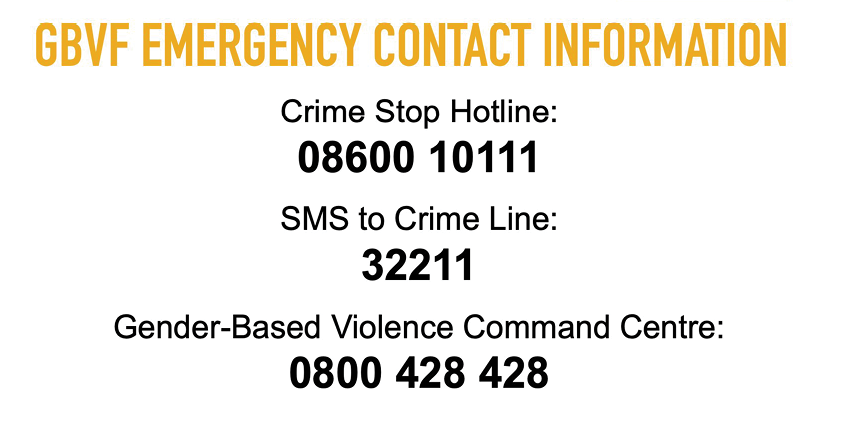
SEDA trains youth to become business owners
SEDA trains youth to become business owners UrsulaThe Small Enterprise Development Agency (SEDA) has empowered another 17 unemployed young people, who are ready to go out into the world and start their own businesses. 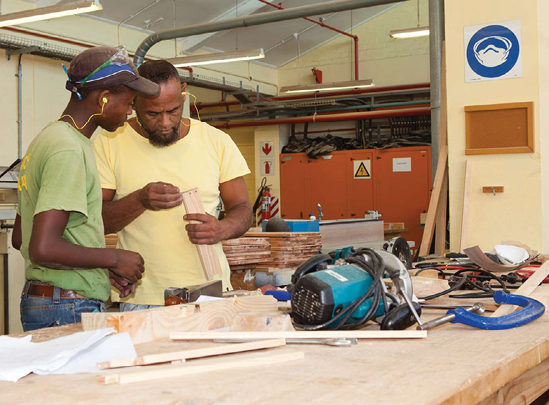
The 17 youths from disadvantaged areas around Cape Town including Phillipi, Nyanga, Gugulethu, Khayelitsha, Mfuleni and Mitchell’s Plain, recently completed SEDA training. The training was delivered by Furntech, a SEDA partner which helps to develop skills and support businesses in the sector of furniture-making.
One of the graduates is Samkelo Nkawu from Phillipi. Nkawu (25) had been struggling to find a job until he saw the opportunity to get involved with the Furntech programme.
“I applied and was happy to be selected as I do not have any qualifications,” says Nkawu.
He explained that the programme included various subjects, including theory, workplace safety, and practical skills needed for furniture-making.
“When we started the programme, I had no knowledge of furniture making. Now I am happy that I can assemble a cabinet. We were introduced to health and safety regulations in a work area so that we can be aware of any possible dangers in the workplace. We spent another two weeks conducting theory and learning about the tools necessary to do the work required.”
SEDA will now encourage the graduates to go about starting their own businesses, with support from the agency’s business development unit.
“SEDA has encouraged us to start our own businesses, and they will provide coaching and business development support. I hope to be able to start my own small business making and selling furniture.”
James Vos, Mayoral Committee Member for Economic Opportunities at the City of Cape Town, said that SEDA, which has branches around the country, provides great opportunities for the youth to learn new skills and access work opportunities.
“Skills are essential for economic growth and the City is committed to growing Cape Town’s economy by providing a steady skills pipeline. The City has a long–standing partnership with SEDA, which enables us to better assist businesses and link them to the various branch offices across the City, providing easier access.”
Vos added that it is especially important to focus on youth development at this time of the coronavirus (COVID-19) pandemic.
“As we start to recover from the impact of the lockdown measures due to the COVID-19 pandemic, together with the officials in the Enterprise and Investment Department, I will continue to work hard to ensure that our economy and businesses have access to skilled people, thereby ensuring that we can get back to work and build a stronger, diverse and inclusive economy.”
Furntech has trained almost 7 000 learners since it was established, creating 2000 direct and indirect jobs in the furniture industry.
*For more information about getting support through SEDA, call the National Information Centre toll-free on 0860 663 7867.
Save lives: Download COVID Alert SA
Save lives: Download COVID Alert SA SiboneloThe National Department of Health and private sector partners have developed a new free-to-use mobile phone application that can help slow the spread of COVID-19 and save lives.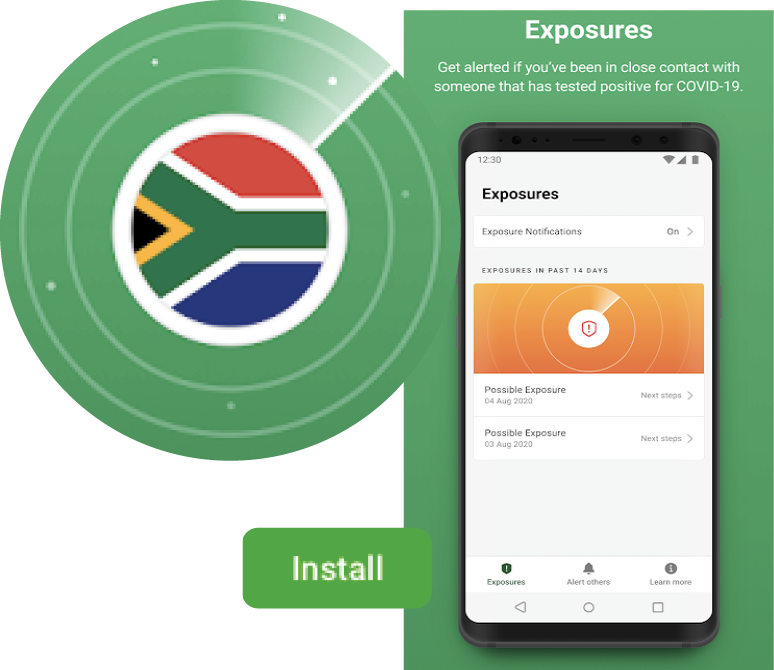
To slow the spread of COVID-19, positive cases must be detected early. People who have made contact with those who have contracted the virus need to be made aware.
This process is called contact tracing and it enables people who could have been exposed to the virus to get the help they need. This could be testing, isolation or quarantine.
Contacting people directly to let them know they have been in contact with someone who has tested positive takes a long time. Also, because many people do not show symptoms of the virus, they do not know that they have it. When they go shopping or use public transport, they could spread the virus without knowing it.
Government has thus developed a Bluetooth-enabled mobile application called COVID Alert SA.
If you download the app onto your smartphone, it will make connect to the app on other people’s phones when you are close to them. If one of these people test positive for COVID-19, even if you do not know them, you will get a message on your phone telling you that you could have the virus.
To make it possible for all South Africans to use the app, it is free to download and free to use. The app does not ask for your details. It also does not track your location and does not collect any of your personal information.
If you test positive for COVID-19, the app will send a message to those you have been in contact with, but it does not give out your identity. You remain anonymous.
“The launch of this app is a significant milestone in our country’s fight against coronavirus, and will play an important role in preventing a second wave of infections,” says President Cyril Ramaphosa.
“We must work together to prevent a resurgence at all costs. I encourage every South African to download this app,” he adds.
Download COVID Alert SA
Anyone with a Bluetooth-enabled smartphone can download and use the app for free. You do not have to pay for mobile data when you use the app.
Download COVID Alert SA quickly and easily from the Apple App Store or Google Play and follow the prompts.
Sign language given a boost
Sign language given a boost vuyelwanThe lives of deaf people in South Africa are being made a bit easier through improved communication.
South African Sign Language (SASL) is set to be standardised, following the launch of the SASL Charter.
The charter addresses inconsistencies in the use of sign language and ensures that sign language interpreters have the right skills.
Devised by the Pan South African Language Board (PanSALB), the charter aims to address issues relating to communication, access to information and facilities as well social justice for the deaf community. PanSALB’s Acting Executive Head of Languages Nikiwe Matebula says the charter will ensure that interpreters used in public service gatherings and events are competent in SASL. 
Matebula says: “As part of this charter, whenever we procure sign language services, it should be in consultation with the Deaf Federation of South Africa.”
With South Africa marking Deaf Awareness Month in September, the charter forces all government departments and state entities to provide interpreting services to deaf people by training essential services staff in advanced SASL.
According to the PanSALB Board Chairperson David Maahlamela, the charter is based on the ‘nothing about us without us’ disability movement.
“The launch of the charter is a giant stride towards ensuring the officialisation of SASL as the 12th South African official language,” he says.
The charter calls for the availability of competent interpreters at government service points like police stations. The charter also calls for:
- Nationwide recognition of SASL.
- The promotion of learning in and about sign language.
- Consultation with the deaf community on all matters about them.
- Ensuring that all those working with deaf people are fit for the job.
- Sufficient multilingual education for deaf children.
- Guaranteed access to services for deaf people.
“Being deaf should not be a hindrance when they try to access services,” says Matebula.
Speaking at the launch of the charter, Deputy Minister in The Presidency for Women, Youth and Persons with Disabilities Hlengiwe Mkhize said: “We must ensure that SASL is a right that people can access.”
The charter is available in video format.
For more information, visit PanSALB’s website www.pansalb.org or visit one of the organisation’s provincial offices.
Sunny times ahead for informal traders
Sunny times ahead for informal traders SiboneloSol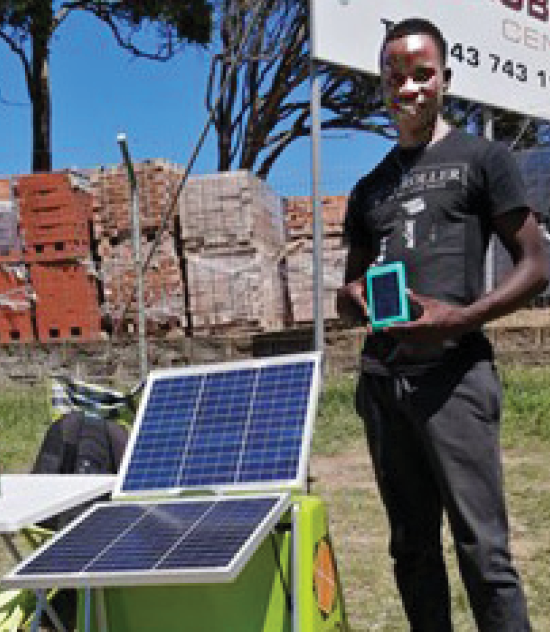 ar power is brightening the lives of informal traders Gcina Dzingwe (20) and Ndileka Gleyi (32).
ar power is brightening the lives of informal traders Gcina Dzingwe (20) and Ndileka Gleyi (32).
Turtlepreneur is an initiative of SolarTurtle that enables entrepreneurs to use the power of the sun to make a living. Participating traders are given a solar-powered battery kit that provides electricity wherever they trade.
The solar-powered battery kit can be used in a number of ways to make money – for instance, as a cellphone charging station where customers pay to charge their phones, or an Internet spot where people pay for connectivity or for the printing of documents.
The project is supported by the Department of Science and Innovation and the South African National Energy Development Institute.
SolarTurtle offers a number of different products. Its BabyTurtle range is aimed at informal traders. These kits are smaller, more affordable and come in three different versions – a motor vehicle trailer, a bicycle trailer and a suitcase.
Dzingwe says the Turtlepreneur business training project has equipped him with the skills and equipment he needed to start a business.
“The kit I have enables me to charge 20 cellphones, print documents and even provides WiFi hotspots for my customers wherever I am,” he says.
The King William’s Town youngster previously sold chips and sweets but becoming a Turtlepreneur has enabled him to expand his business and attract new customers. He intends moving his business to nearby Ndevana village, where power outages occur frequently.
Gleyi, who hails from East London, says she will start her own business once she completes her training with BabyTurtle.
BabyTurtle Field Manager Patricia Pindura says 17 informal traders and small business owners are currently being trained as Turtlepreneurs.
Minister of Higher Education, Science and Innovation Dr Blade Nzimande said at the launch of BabyTurtle in August that his department wants to assist marginalised communities with power and Internet connectivity.
He said the ability to use mobile energy supply solutions to improve access to Internet connectivity will assist the country in ensuring that disadvantaged communities are part of the transition towards the Fourth Industrial Revolution.
You can help someone who has had a stroke by:
- Making sure they take their medicine on time.
- Empowering them to do things on their own.
- Helping them develop hobbies that will exercise their mind.
Tourism business beats COVID-19
Tourism business beats COVID-19 SiboneloInnovative thinking and a willingness to change has helped a tourism business battered by the Coronavirus Disease (COVID-19) stay afloat. 
1 000 Thrills, based in the Valley of 1 000 Hills in KwaZulu-Natal, had to put its rural-township tourism experience – aimed at international tourists – on the back burner because of the closure of international borders.
Owner of 1 000 Thrills Nomcebo Langa (39) says they had to adapt their business, which primarily offers an authentic Zulu life experience, including the chance to visit a village’s induna and sangoma, enjoy traditional food and sleep in traditional huts.
She says the business now makes the majority of its money from spa treatments. Langa says the demand for massages and other spa treatments has grown because people are looking for therapeutic ways of dealing with COVID-19.
The spa was not our primary area of business but we needed to adapt to survive, she says. “People have been locked in their home for months and they need help to cope with everything.”
With the country now having moved to Alert Level 2, Langa is looking forward to welcoming visitors again. She says they are revising their packages to focus on the South African market as the country’s borders remain closed.
The impact of COVID-19 on the tourism sector was felt as early as February. “As countries started going into lockdown in February, we went from being fully booked to having mass cancellations. Things got worse once the country went into lockdown.”
1 000 Thrills, which Langa started in 2017, currently employs 13 permanent staff members. Another 22 people are employed part-time during busy periods.
The growth of 1 000 Thrills would not have happened without the exposure gained from taking part in international tourism exhibitions. Langa says Tourism KwaZulu-Natal (TKZN) funded trips to exhibitions in China, Russia and South Korea, which helped attract clients from all parts of the world.
Tourism businesses looking to benefit from TKZN’s programmes can call 031 366 7500 or email enquiries@zulu.org.za
Transforming the taxi industry
Transforming the taxi industry UrsulaTransport Minister Fikile Mbalula has invited the taxi industry, workers, commuters and civil society to take part in a public dialogue about the future of the taxi industry. 
The aim of the initiative is to hear the needs and concerns of everyone involved – including commuters – so that their opinions can be included in the plan to formalise and regulate the industry.
The Minister says the taxi industry must benefit every single taxi operator and not just those in positions of leadership.
Various means will be used to get people’s opinions before provincial makgotlas are held between 20 September and 20 October on virtual platforms (online). These provincial events will feed to the National Taxi Lekgotla scheduled to take place on 29 and 30 October 2020, at the end of Transport Month.
Minister Mbalula foresees that the national taxi indaba will transform the taxi industry in a ground-breaking manner.
“The outcomes of this Lekgotla will not be lip service, but a tangible and achievable programme of action that will set the industry on a sustainable path,” says the Minister.
He says the National Taxi Lekgotla will be about re-imagining a taxi industry of the future, where it is a major player in the economy.
The build-up towards the Lekgotla will consist of the following activities:
- The public discourse platform – a dialogue with industry and civil society on topical issues that require resolution.
- The release of discussion documents and a structured roll-out of debates across all digital platforms to sustain the conversation and engage stakeholders in robust discussions on all identified themes of the National Taxi Indaba. The Minister and provincial MECs will lead these conversations.
- A task team will engage with various stakeholders on proposals and other themes to inform the discussions.
- Webinars targeting thought leaders, opinion-makers and other stakeholders will be held to share perspectives and enrich the conversations.
In addition, the Minister says discussions will also include road safety, customer care and commuter safety, and gender-based violence.
Woza Matrics launched
Woza Matrics launched vuyelwanThe Woza Matrics programme aims to help all Grade 12 learners pass their final examinations.
This year’s matriculants have to faced considerable challenges because of the Coronavirus Disease (COVID-19).
The Department of Basic Education (DBE) has ensured that the safe re-opening of schools is one of its top priorities, along with supporting learners with various programmes to help them successfully complete the academic year.
One of these is the Woza Matrics programme, which was launched on 1 September in collaboration with a number of broadcasting partners and educational experts. 
As part of the programme, catch-up lessons on six key matric subjects are being aired on SABC, DStv and Openview (Channel 122) every day for 12 weeks, from 8am to 10am and 1pm to 3pm. The goal is to help learners to prepare for their final exams.
The platform also provides live lessons, during which learners can ask teachers questions. Exam tips are also provided. Woza Matrics recognises that while all learners have lost school time, Grade 12s have been the most severely affected, as their marks are extremely important for their career and university acceptance.
Basic Education Minister Angie Motshekga says the programme is vital, considering the disruption to learning caused by COVID-19.
“Matric is always stressful, but 2020 has been filled with unusual stresses. I want to congratulate all our Grade 12 learners and their families for their perseverance and determination. It is abundantly clear that additional support is required for learners and we will continue to provide this. There are a few months left before the end of the year and Woza Matrics will give learners the support they need to prepare for the final exams,” she says.
The programme is unique in that it targets the majority of Grade 12s in the country who do not have regular access to the Internet and connected digital devices.
Broadcasts will be available to view by most of the 1.2 million learners who are writing Matric exams in November. The Council of Education Ministers has urged all learners and parents to make use of the platform.
SABC CEO Madoda Mxakwe says the broadcaster is proud to be part of the initiative. “We are pleased to be one of the key role-players in saving the 2020 Matric year. As a public service broadcaster, we are duty-bound to ensure that our content includes a significant number of educational programmes, particularly during a period when it is most needed.”
Your questions answered
What subjects will be covered?
- Maths
- Geography
- Life sciences
- Physical sciences
- Accounting
- Maths literacy.
Why were these time slots chosen, because learners could be at school?
- School attendance times vary across districts and provinces, due to social distancing measures. Many Matrics will be at home at the time of broadcasting.
- A small percentage of learners are also being home-schooled.
- The main broadcasts will be repeated after 4pm on Openview and are available on DStv Catch-Up.
Why only matrics?
- Matrics are under the most pressure to plan their post-school lives.
- Matrics have faced more significant disruption to their schooling since March 2020 because their curriculum was not shortened.
- Matrics have fallen the furthest behind on curriculum learning.
Where can I find the viewing schedule?
The viewing schedule is available in TV guides and on the Woza Matrics website at wozamatrics.co.za. Repeat broadcasts will be available.
Is support being provided to parents and teachers?
Yes. The broadcast schedule will have some sessions on tips for parents on ways to support their Matric children. Some sessions will focus on teachers and the DBE's Teacher Connect WhatsApp platform will communicate key messages to teachers.
Will there be a focus on dealing with the stresses faced by matrics?
Yes. There will be several sessions focused on providing tips for student well-being, coping with stress and managing anxiety.
Young tennis star takes gold
Young tennis star takes gold SiboneloIn a mere four years, Zikhona Xate (12) has gone from knowing nothing about tennis, to being the first Eastern Cape player to win gold at a Tennis South Africa (TSA) Super Eight tournament.
Xate, a Grade Seven learner at JK Zondi Primary School in Zwide, Port Elizabeth, represents the Emntsalani Junior Tennis Club.
She started playing tennis when her coach, Mbulelo Lugogwana, recruited her at school. “I fell in love with the sport and have never looked back,” says Xate.
Xate started playing tennis at Zwide Stadium. “As I got better, I trained at Wembley Tennis Club in Mill Park. Now I take private lessons there.”
Headed by Lugogwana, Emntsalani Junior Tennis Club recruits, trains and organises tournaments for children from no-fee paying schools in Zwide. It has 27 players, ranging in age from seven to 14, and 13 of them are registered with TSA.
“We recruit players from these schools because they don’t have access to resources,” he says.
Lugogwana says Xate’s success is helping to promote tennis in the area.
The club partnered with Wembley Tennis Club to improve the quality of training the players receive. “Our partnership ensures our players are coached by more experienced coaches, who have a deeper knowledge of the game,” says Lugogwana.
“It also gives township-raised kids a chance to play at professional level. Players like Zikhona are the future of the sport in South Africa,” he adds.
The players who train at Wembley Tennis Club also receive conditioning training at one of the best gyms in the country. Lugogwana says their physical development is a key aspect to sustaining them in the sport.
Xate’s mother Piwe Xate (32) says her daughter’s tennis progress has astounded her, and her grades have also improved since she started playing tennis.
“Even her teachers are encouraging her to play tennis. Parents must support their children’s dreams by watching their games and ensuring they have everything they need to play the sport,” she says.